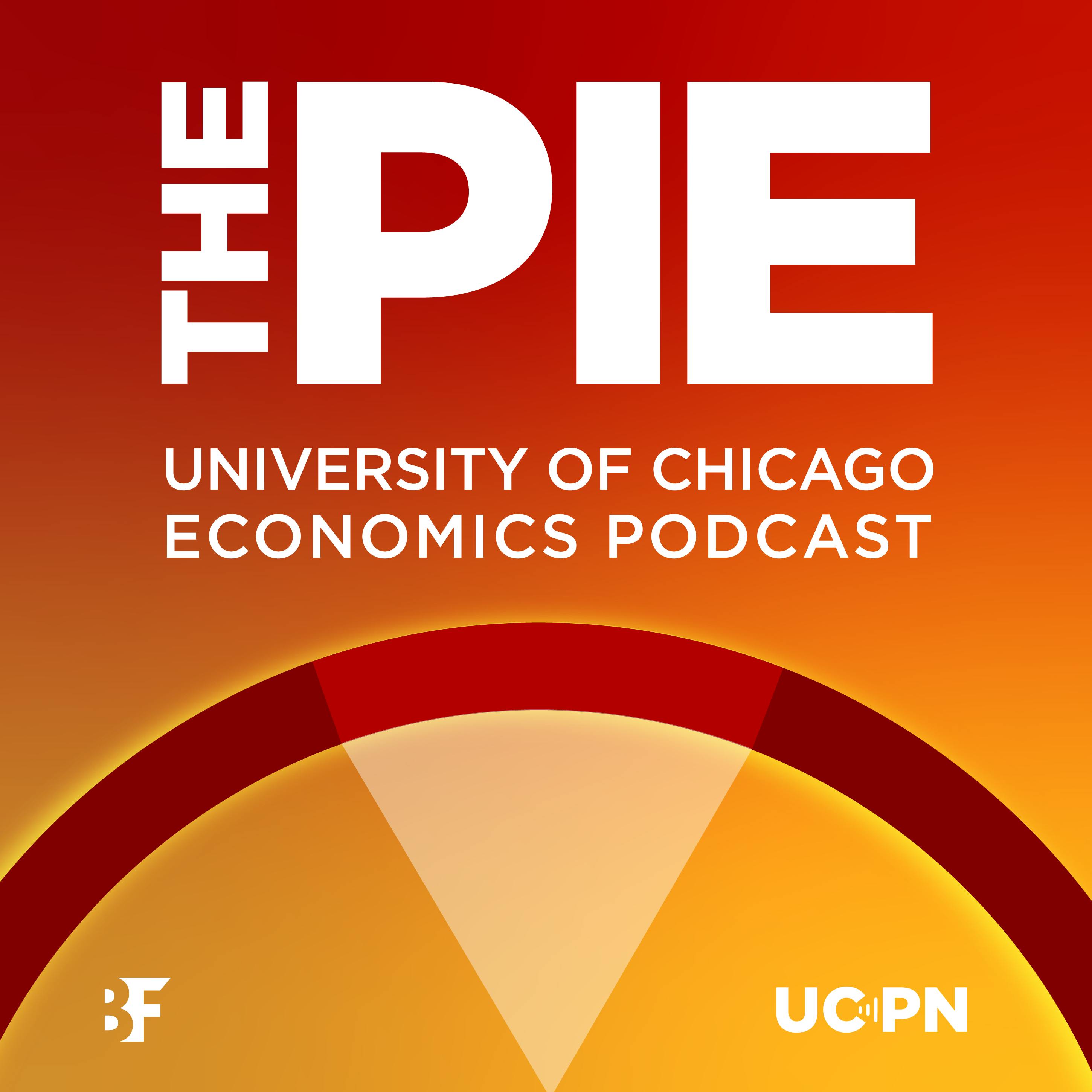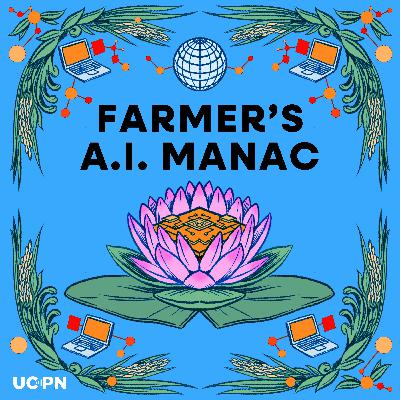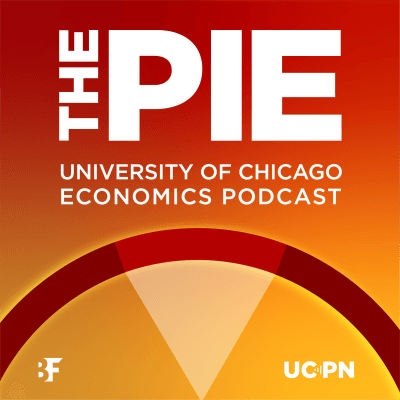Discover The Pie: An Economics Podcast
The Pie: An Economics Podcast

The Pie: An Economics Podcast
Author: Becker Friedman Institute at UChicago
Subscribed: 900Played: 19,895Subscribe
Share
© 2025
Description
Economists are always talking about The Pie – how it grows and shrinks, how it’s sliced, and who gets the biggest shares. Join host Tess Vigeland as she talks with leading economists from the University of Chicago about their cutting-edge research and key events of the day. Hear how the economic pie is at the heart of issues like the aftermath of a global pandemic, jobs, energy policy, and more.
113 Episodes
Reverse
As we close out 2025, host Tess Vigeland highlights research from UChicago scholars. Hyuk Su Kwon, Assistant Professor at the Harris School of Public Policy, explains the design of electric vehicle subsidies. Eduardo Montero, Assistant Professor at Harris, reveals how Seventh Day Adventist churches adapt when members face costly trade-offs between faith and farming. Virginia Minni, Assistant Professor at the Booth School of Business, shares how a one-day purpose workshop where workers connect childhood passions to their current roles drives measurable productivity gains. Plus, Leo Bursztyn discusses why green text bubbles create lock-in effects for Apple. Full versions of these conversations are available wherever you get your podcasts.
In this wide-ranging conversation, Nobel Prize–winning economist Roger Myerson reflects on a career studying how rules shape human behavior, from optimal auction design to Ukraine's decentralization reforms. Myerson explains the foundations of mechanism design and incentive constraints, tracing economics back to Xenophon and arguing that local democracy is what holds democracies together.
Large gaps in language skills between children from different socioeconomic backgrounds emerge early and persist throughout schooling. In this episode, Ariel Kalil, Professor of Public Policy at UChicago's Harris School, discusses her research on "Chat2Learn," a technology intervention that sends open-ended conversation prompts to parents' phones. The low-cost behavioral nudge increases vocabulary, encourages back-and-forth conversation, and fosters curiosity in young children.
What's the greatest driver of economic growth? Love. In this episode, UChicago economist Pablo Peña presents his new book Human Capital for Humans, inspired by Nobel laureate Gary Becker's legendary doctoral course. In conversation with host Tess Vigeland, he discusses how simple economic principles illuminate life's biggest matters, from parenting and marriage to jobs and schooling.
Deirdre McCloskey argues the world's jump from $2 to $50 per day in average income came from a radical 18th-century shift: equality of permission, or letting ordinary people have a go at bettering themselves. She traces how liberating human creativity through what she calls the "bourgeois deal" sparked innovation from Holland to Scotland to America, while state control stifled it elsewhere. McCloskey critiques modern economics for reducing humans to "vending machines" and argues we need "humanomics" that recognizes love, ethics, and human complexity alongside mathematical models. She challenges the field's statist turn, defends Adam Smith's complete vision beyond self-interest, and explains why India may become the next great creative economy while Europe's trillion-dollar spending plans repeat the old mistake of top-down investment instead of unleashing individual creativity.
According to the TIAA Institute, American adults correctly answered just 49% of basic financial questions in 2024, suggesting a fundamental gap in economic literacy. In this episode Robert Shimer, Professor of Economics at the University of Chicago, and John List, Professor of Economics and Director of the Becker Friedman Institute, discuss Economics for Everyone, a groundbreaking program that teaches economic reasoning without the math. From classroom experiments that predict market equilibrium to 60 professional videos watched worldwide and teacher training programs across Chile, Colombia, and Saudi Arabia, they explore how economic thinking shapes everything from Instagram scrolling to tariff policy, and why critical thinking about causality versus correlation has never been more important.
A warmer world is here. Now what? Listen to Shocked, from the University of Chicago’s Institute for Climate and Sustainable Growth, and hear journalist Amy Harder and economist Michael Greenstone share new ways of thinking about climate change and cutting-edge solutions: https://lnk.to/shockedpodcastFD!thepie
The secret to winning in a rigged economy isn't changing the rules, argues Redfin Chief Economist Daryl Fairweather, but mastering the game. In this episode, Fairweather, the first Black woman to earn a PhD from UChicago's Economics Department, reveals economic "cheat codes" for navigating the modern workplace, from decoding performance reviews to discovering your true market value.
When couples move for work, whose career takes the hit? UChicago economist Matt Notowidigdo discusses research showing that when heterosexual couples relocate, men's incomes increase by 10-15% while women's earnings barely budge, generating earnings gaps that last for years. Plus, couples are more likely to move when the man loses the job compared to the woman.
Nobel laureate James Heckman explains why ages zero to five are critical for brain development and lifelong outcomes. He discusses the Perry Preschool Program's surprising health benefits 35 years later, why low-cost home-visiting programs that engage parents outperform expensive institutional interventions, and how "dynamic complementarity" means early skills beget later skills. Heckman also critiques economics' "credibility revolution," arguing the field has traded big-picture understanding for narrow "clean" answers—illustrated by his recent Wall Street Journal op-ed showing that contrary to popular belief, the China trade shock created net job gains for the US.
What happened to contraceptive choices when the Supreme Court's Dobbs decision reversed Roe v. Wade in 2022? UChicago's Yana Gallen uses health insurance claims from millions of Americans to examine the ripple effects and reveal surprising patterns.
Can a day of self-reflection improve workplace performance? UChicago economist Virginia Minni reveals findings from a randomized trial involving nearly 3,000 employees who participated in a "Discover Your Purpose" workshop. Minni explains how bottom-up meaning-making creates lasting change, and why helping employees connect their personal purpose to their daily work benefits both human fulfillment and business results.
America was once a nation in constant motion: One in three Americans moved every year in the 19th century, chasing opportunity from one town to the next. But that mobility has collapsed, falling by more than half since 1970. In this episode, University of Chicago economist Peter Ganong and Atlantic deputy executive editor Yoni Appelbaum explore how housing regulations have created a two-tier system where only high earners can afford to move to opportunity-rich cities.
View the related interactive Research Brief by The BFI Data Studio.
Historically, one major reason has consistently been cited for the growth in housing costs in this country: the rising cost of building homes. But that relationship is changing. In this episode, University of Chicago economist Chad Syverson breaks down 75 years of data to reveal a surprising truth—construction costs and housing prices have become "completely decoupled." From the post-WWII boom to today's record-breaking market, Syverson explains why building materials and labor costs can no longer explain skyrocketing home prices, and what factors are really driving the housing affordability crisis.
Economists often focus on wages when studying the labor market, but paychecks tell only part of the story. University of Chicago economist Evan Rose and his co-authors surveyed 20,000 Danish workers to put a dollar value on the intangible perks of a job, things like flexible hours, workplace culture, and stress levels. Rose discusses how these “hidden benefits” shape labor markets, why economists need better data on job quality, and what this all means for workers, firms, and policymakers.
Textbooks don't just teach facts, they shape how children understand the world and their place in it. In this episode, UChicago economist Anjali Adukia discusses her study of textbooks across public schools, religious private schools, and homeschools. Using advanced AI tools to analyze tens of thousands of pages, she uncovers both unexpected similarities between politically divergent states and meaningful differences in how religious and secular curricula present topics from evolution to gender representation.
What happens when your religion forbids the production of crops that dominate your local economy? In this episode, UChicago economist Eduardo Montero unpacks new research on the economic costs of religious prohibitions, and how these trade-offs shape church membership, satisfaction, and even sermons.
A text bubble might seem trivial, until it shapes market dynamics, personal identity, and federal lawsuits. In this episode, UChicago economist Leo Bursztyn discusses how Apple’s green bubble design creates a powerful lock-in effect that reinforces Apple’s market dominance.
How is AI impacting the economy today? What might this mean for tomorrow? This episode brings you inside a discussion hosted at BFI in April. Moderated by Caroline Grossman, Executive Director of the Rustandy Center for Social Sector Innovation, the conversation features: Anders Humlum, Assistant Professor of Economics, Chicago Booth; Sanjog Misra, Professor of Marketing, Chicago Booth & Faculty Director of the Center for Applied AI; Samir Mayekar, Associate VP and Managing Director, Polsky Center for Entrepreneurship and Innovation; and Alex Tamkin, Research Scientist at Anthropic and lead researcher on the new Anthropic Economic Index.
Economist Brent Neiman recently returned to UChicago from his position as Deputy Undersecretary for International Finance at The US Treasury, only to find his research being used (and misused) in the Trump administration’s sweeping new tariff policy. In this episode, Neiman walks us through what the original study actually showed, how it got misinterpreted, and why today’s tariff regime marks one of the most consequential trade shifts in decades.

























this is the dumbest conversation I've heard recently
don't think she would have taught a second class at my university...
At no point in the podcast do the authors offer the option of west reducing per capita energy consumption to offset rising energy production by the east. why dont you guys reduce your per capita consumption and meet us in the middle so everyone has same per capita consumption.
thanks castbox for subscribing me to this podcast without my knowledge